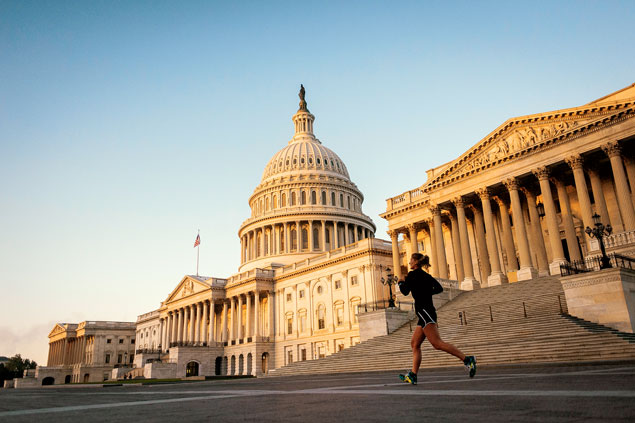There’s perhaps no greater insult to the young, starry-eyed government workers who come to DC resolved to make a difference than to be told that their work on the budget, foreign policy, trade laws, climate change, or health care is dispensable. Nonessential, in fact—something 400,000 federal employees were told during the recent 16-day federal-government shutdown.
In Washington, where hardly an event goes by without reinforcing or rejiggering a hierarchy, the shutdown sent a stark message.
“It made people think their job was not as important as they thought it was,” says Elizabeth Fischer Laurie, who was furloughed from the Department of Health and Human Services. Laurie, 31, who is also chief of staff at the nonprofit Young Government Leaders, volunteered at the food outreach program DC Central Kitchen during her enforced break. Much of the talk among her fellow furloughed volunteers, she says, was about the essential-versus-nonessential divide.
That divide, naturally, gave some essential employees cause to feel superior.
“It was a little awkward with a friend of mine at State because I wasn’t furloughed and she was,” says a 23-year-old program analyst at the State Department. On the other hand, he says, “she was going out and taking advantage of all the shutdown specials around town and inviting me, and I still had to work.”
But if the State staffer had any guilt about his situation, he didn’t betray it. He admits he would have felt worse had he been furloughed: “What that says is that the work you’re doing is important but not important enough.” Pre-shutdown, the dividing line—“Are you a contractor or a full-time federal employee?”—was its own form of one-upmanship. But the implication carried less of a sting.
It should be noted that “nonessential” and “essential” are misnomers. Those employees who aren’t furloughed are either “excepted” because they perform a lifesaving or security function or “exempt” because of quirks in how their agency or job is funded.
Byzantine appropriations rules stipulate that elements of the State Department be funded on multiyear budgets, ensuring that State, unlike the Environmental Protection Agency or even the Justice Department, had money in its coffers to pay its employees. Who worked and who didn’t was mostly determined by the luck of the draw. (Reports of exempt and excepted senior staff fumbling to answer phones or even send e-mails threw into question just whose tasks were “essential.”)
Still, many were left wondering whose jobs are safe if shutdowns become the way budget negotiations get done. “It took away a lot of our job security,” says Purnita Howlader, 31, who was sent home for three days from her human-resources job at the Federal Emergency Management Agency.
Because job security is what drew many younger government workers to Washington, agencies that saw the most furloughs could become toxic zones. Laurie, who has no plans to leave HHS, says that if she were ever to look for a new job in the federal government, she would keep in mind whether employees at that agency had been deemed essential or nonessential.
Daniel Madrzykowski, a fire-protection engineer at the National Institute of Standards and Technology who was furloughed, believes the general uncertainty could affect recruiting. “There’s a cloud hanging over the government,” says Madrzykowski, who notes that the budget battles could return in January. Other government workers report more chatter lately about people wanting to leave.
For those who stay, the shutdown isn’t likely to help morale. “The majority of folks my age have the opportunity to work elsewhere,” says the State Department staffer, who previously worked at Apple. “They decided to work in the government because of a higher sense of calling, to do something more altruistic.”
Entry-level Hill salaries are about $30,000 a year. Alyssa Farah, director of communications for a political nonprofit, knows Hill staffers who worked part-time jobs while their pay was being held. Now the furloughed, like jilted spouses, have to go back to repair the relationship.
For the most part, the essential and nonessential alike say things are getting back to normal—disturbingly so to at least one recent hire who was furloughed.
“Everyone was like, ‘Oh, hi—what was I working on?’ But there has been zero, zero, zero change, which makes the whole thing seem like more of a waste of money.”
This article appears in the December 2013 issue of Washingtonian.

















